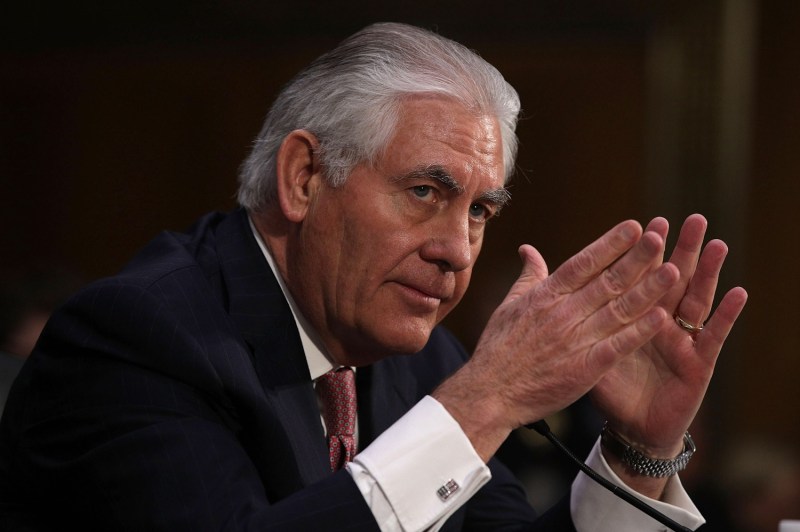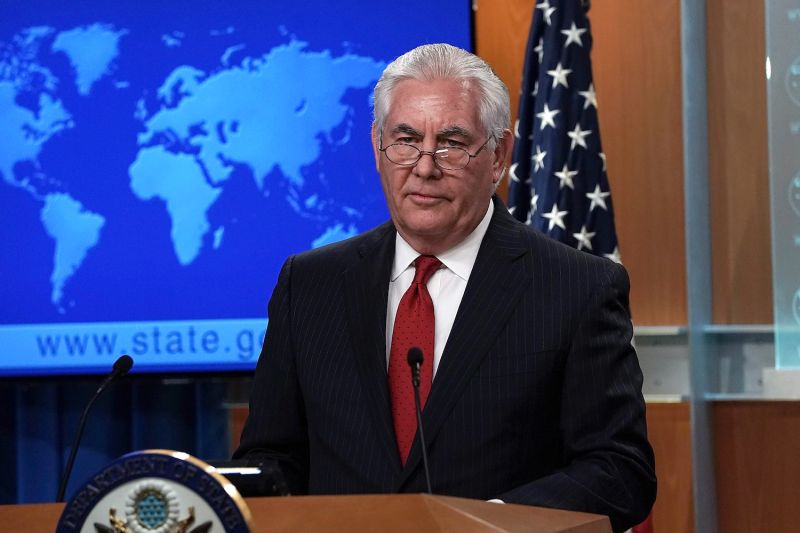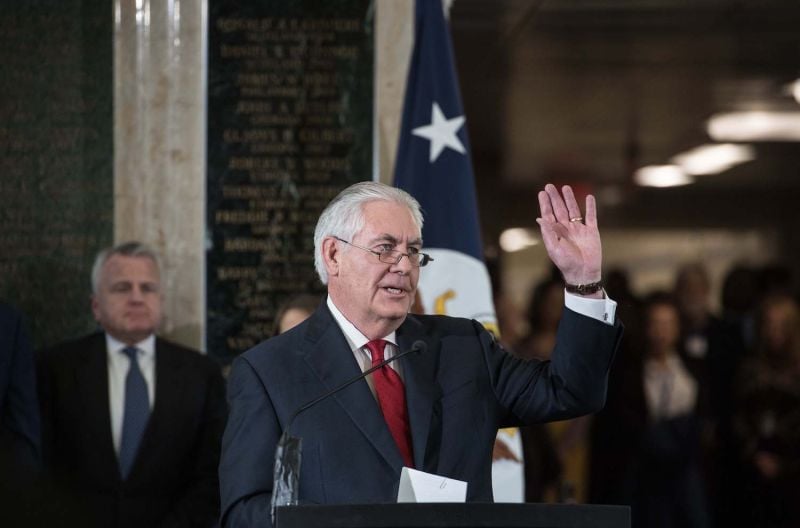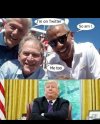Install the app
How to install the app on iOS
Follow along with the video below to see how to install our site as a web app on your home screen.
Note: This feature may not be available in some browsers.
You are using an out of date browser. It may not display this or other websites correctly.
You should upgrade or use an alternative browser.
You should upgrade or use an alternative browser.
Yhdysvaltain presidentinvaalit 2020
- Viestiketjun aloittaja Rantojen mies
- Aloitus PVM
Panssari Salama
Respected Leader
Laitetaan tänne, eli Trumpin ex-secretary-of-state Rex Tillersonin haastettelu. Klikkiotsikko, mutta hyvää luettavaa.
Kertoo mm. että Putin olisi kaikista helpoin henkilö ulkopolitiikan kannalta, koska sen kanssa turha keskustella mistään, uskoo vaan voimaan. Ihmettelee, miksi edelleen myönnytään ja neuvotellaan.
Mielenkiintoinen näkemys Kiinasta, "sotaa pukkaa", kertoo jo että Exxonin toimarina kiinalaisten sota-alusten tekemä järjestelmällinen häirnitä öljylauttoja vastaan alkoi olla jo ilmiselvä toimintamalli.
Ei liene yllätys, että Trumpin Erittäin Vakaata Neroutta ei juurikaan arvostanut. Ihmetteli usein, kylläkin.
Käykeepä lukemassa.
Tillerson on the Foreign-Policy Mess Trump Is Leaving Behind
Kertoo mm. että Putin olisi kaikista helpoin henkilö ulkopolitiikan kannalta, koska sen kanssa turha keskustella mistään, uskoo vaan voimaan. Ihmettelee, miksi edelleen myönnytään ja neuvotellaan.
Mielenkiintoinen näkemys Kiinasta, "sotaa pukkaa", kertoo jo että Exxonin toimarina kiinalaisten sota-alusten tekemä järjestelmällinen häirnitä öljylauttoja vastaan alkoi olla jo ilmiselvä toimintamalli.
Ei liene yllätys, että Trumpin Erittäin Vakaata Neroutta ei juurikaan arvostanut. Ihmetteli usein, kylläkin.
Käykeepä lukemassa.
Tillerson on the Foreign-Policy Mess Trump Is Leaving Behind
‘We’re in a Worse Place Today Than We Were Before He Came In’
Former U.S. Secretary of State Rex Tillerson on the mess Donald Trump is leaving behind.
BY KELLY BJORKLUND | JANUARY 11, 2021, 7:00 AM

Rex Tillerson testifies during his confirmation hearing to be U.S. secretary of state before the Senate Foreign Relations Committee in Washington on Jan. 11, 2017. ALEX WONG/GETTY IMAGES
President Donald Trump is on the way out of office—perhaps even earlier than the Jan. 20 inauguration of President-elect Joe Biden. But the legacy he leaves behind—not just in terms of increasingly polarized domestic politics but also in terms of foreign policy—will greatly shape the next administration right out of the gate.
The Trump administration spent years ramping up the confrontation with China, with little to show for it. The “maximum pressure” campaign on Iran only redoubled Tehran’s development of nuclear materials. Russian efforts to undermine NATO have continued undeterred. And U.S. relations with traditional allies have grown more frayed.
Trending Articles

Another Base Attack in Afghanistan Hushed Up to Hurry U.S.…
Camp Chapman, once the scene of the CIA’s second-deadliest day, was hit again in December—but never reported.
Powered By
Just before a Trump-inspired mob stormed the U.S. Capitol this week, Foreign Policy spoke with Rex Tillerson, Trump’s first secretary of state, about his former boss, the state of the world, and the challenges facing the Biden administration. This conversation has been edited for length and clarity.
Foreign Policy: You served at the pleasure of the president but at the same time were charged with advancing U.S. national interests. Did you ever find those two things at odds with each other?
Rex Tillerson: Yes. There were multiple occasions where, in my view, the actions the president wanted to take were not consistent with our national security objectives. But I want to be quick to add here that he’s the president. He got elected; I got appointed. I did get confirmed by the Senate, and I had the authority and the legitimacy that go with that office, but I also had to be true to myself and true to my own beliefs, and when the president asked me to take this job, he was asking me for help. And I told him on multiple occasions, “Look, I’m here to help you, and if I can’t help you, if I’m not helping you, then I need to move on.”
FP: Was it difficult to get a message through to the president? How did you navigate that when the stakes were so high?
RT: His understanding of global events, his understanding of global history, his understanding of U.S. history was really limited. It’s really hard to have a conversation with someone who doesn’t even understand the concept for why we’re talking about this.
Trump’s “understanding of global events, his understanding of global history, his understanding of U.S. history was really limited.”I had to constantly evaluate my last conversations with him—what seemed to resonate, what seemed to get across, what didn’t—and I would try different approaches with him. I used to go into meetings with a list of four to five things I needed to talk to him about, and I quickly learned that if I got to three, it was a home run, and I realized getting two that were meaningful was probably the best objective. So I began to adjust what I went into a meeting with and what I attempted to explain and describe, and then I started taking charts and pictures with me because I found that those seemed to hold his attention better. If I could put a photo or a picture in front of him or a map or a piece of paper that had two big bullet points on it, he would focus on that, and I could build on that. Just sitting and trying to have a conversation as you and I are having just doesn’t work.
FP: If you’re having a hard time briefing him, and he’s not reading the briefings on important subjects, how does one make an informed decision then?
RT: Well, that’s the key. I’m not sure many of those decisions were well informed.
READ MORE
The Quiet Death of Tillerson’s ‘Redesign’ of State
Overhauling Foggy Bottom was once a centerpiece of the Trump administration’s reforms. Where did those plans go?
REPORT | ROBBIE GRAMER
Tillerson Decries ‘Mean-Spirited’ D.C. in Farewell Address
Tillerson gave a four-minute farewell speech to State Department employees. His legacy will last much longer.
REPORT | ROBBIE GRAMER
I think the other challenge that I came to realize early on is there were so many people who had access to his ear who were telling him things, most of which were untrue, and then he began to listen to those voices and form a view that had no basis in fact. So then you spent an inordinate amount of time working through why that’s not true, working through why that’s not factual, working through why that’s not the basis on which you want to understand this, you need to set that aside, let’s talk about what’s real. I think that was as big a challenge as anything. There were other people giving him information that was not accurate, every day, usually before I got to see him. First thing in the morning and not from people inside the White House. It was really frustrating.
FP: One thing that always stood out to observers was the constant disparagement of U.S. allies. How did you view that?
RT: Well, he saw those as people who were weak. He used to say that over and over again. I don’t know why he viewed them as weak, other than they were overseeing free countries. It was very bizarre, and I could never understand that, and I still don’t.
FP: But while the president was disparaging France, Germany, Canada, and NATO, he seemed to want to do favors for authoritarian leaders. Why?
RT: It’s a really interesting question—I don’t know. Someone would have to get inside his head to try to figure it out. The only rationalization I could come to was that he thought, “Well, if I disparage my allies and treat these bad guys as my friends, I’ll get more done with them in U.S. interests.” Maybe he thought, “I’ll let [North Korean leader] Kim [Jong Un] know we’re big buddies, and he’ll give up his nuclear weapons. I’ll let [Russian President Vladimir] Putin know we’re big buddies, and he’ll get out of Ukraine.” That’s the only way I could rationalize it, but I really don’t know.
FP: Did you ever see it play out in favor of U.S. interests, this disparaging of allies and friendship with authoritarians?
“We squandered the best opportunity we had on North Korea.”RT: No. Nothing worked out. We squandered the best opportunity we had on North Korea. It was just blown up when he took the meeting with Kim, and that was one of the last straws between him and I.
With Putin, we didn’t get anything done. We’re nowhere with China on national security. We’re in a worse place today than we were before he came in, and I didn’t think that was possible.
FP: You spent a lot of time on U.S.-Turkey relations, which have only gotten tenser of late. Where do you see that relationship heading?
RT: The relationship is extraordinarily important to the United States because of Turkey’s geographic location, but the country is also very pivotal with respect to future relations with Russia and depending on which way it leans. So it is very important that the United States maintain a dialogue with Turkey and keep it in the NATO fold, notwithstanding the fact that the leadership is making that difficult, but keep it aligned with the West.
FP: Like the purchase of the S-400, the Russian air defense system?
RT: I’m very concerned. The S-400 was a significant opportunity for [Turkish President Recep Tayyip] Erdogan to signal back to the United States that he was not looking to lean toward Russia and away from us. There were countless conversations with him about the consequences of purchasing the S-400s, and Erdogan was given ample and multiple warnings of what a provocative step Turkey was taking. Putin desperately wanted to sell that system to Turkey not for the economic reasons but for the geopolitical reasons—he knew it would create a lot of problems in the relationship with Turkey to NATO, and of course that’s what Putin does. He likes to go out there and plant these cherry bombs that create problems for everybody.
FP: What about Turkey’s apparent move away from its traditional mooring in the NATO alliance, more toward Russia?
RT: It presents NATO with some really complex challenges. To the extent that Putin has success with Turkey, he will begin to think about who else he can pick off within NATO and begin to pull away. I think that’s the challenge for NATO—who is next? How will Putin try to gradually erode the NATO alliance? At least along the fringes, at least with those along his border and how he pulls those to his direction. To the extent that there are little repercussions from NATO is just going to encourage Putin to go after others.
FP: What would be your advice for the incoming administration?
“I have a fear that we will come to military conflict with China within the decade.”RT: I think China is the biggest worry. I have a fear that we will come to military conflict with China within the decade and it will be when they make their move on Taiwan. They’ve been putting all of their pieces in place for a long time now to do that, and that is [Chinese President Xi Jinping’s] legacy, to reunite China.
With the island-building and the militarization of the islands [in the South China Sea], I got excoriated during my confirmation hearings when I said we may need to put a blockade in to stop China from militarizing them. I got ripped up from all kinds of people for being a warmonger, but I had been watching those islands being built from my role at ExxonMobil for years, where the Chinese in the South China Sea sent out gunboats to our rigs and against our seismic crews. And I just think that is where it is headed. I think it’s Xi’s plan to raise the stakes so significantly to U.S. military losses that the American people will say, “Wait a minute, we’re going to incur thousands of casualties to save Taiwan. Why would we do that?” And then China will get it de facto, or we’ll have a really ugly war in the Pacific. So I think they’ve got to deal with China’s military ambitions.
I think the trade issues are not in a bad place. They’ve just got to get back in coordination with other major trading blocs. I argued hard for the president to stay in the Trans-Pacific Partnership because I feel that’s the best way to deal with China on trade.
With Putin, the problem is he only understands raw power. That is why sanctions don’t work. Putin is your classic bully, and the only way you deal with a bully is when he punches you, you punch him back. I think Putin is one of the most predictable people out there, and you should be able to play the chess game with him. We have more pieces than he does, but for some reason we just don’t seem to want to play the game with him, and I’ve never understood that.
I think that in the Middle East all you can try to do is try to contain Iran and hope that the Israelis don’t do something provocative.
Panssari Salama
Respected Leader
"Bannon".
Panssari Salama
Respected Leader
Sakeaa on ja oli huttu... Ihmekös, jos reipas patriootti lähti laittamaan Penceä narun jatkoksi.
HEROES OF THE INSURRECTION
HEROES OF THE INSURRECTION
Hanski
Respected Leader
Tämäkin haastattelu vahvistaa kuvaa, että Valkoisen talon aikuiset ovat joutuneet toimimaan lapsenvahtina! Rex ei todellakaan kovasti arvosta ex-presidenttiä ja todennäköisesti aivan syystä! Rex itse sen sijaan oli yksi harvoista todella pätevistä Trumpin hallinnon jäsenistä.Laitetaan tänne, eli Trumpin ex-secretary-of-state Rex Tillersonin haastettelu. Klikkiotsikko, mutta hyvää luettavaa.
Kertoo mm. että Putin olisi kaikista helpoin henkilö ulkopolitiikan kannalta, koska sen kanssa turha keskustella mistään, uskoo vaan voimaan. Ihmettelee, miksi edelleen myönnytään ja neuvotellaan.
Mielenkiintoinen näkemys Kiinasta, "sotaa pukkaa", kertoo jo että Exxonin toimarina kiinalaisten sota-alusten tekemä järjestelmällinen häirnitä öljylauttoja vastaan alkoi olla jo ilmiselvä toimintamalli.
Ei liene yllätys, että Trumpin Erittäin Vakaata Neroutta ei juurikaan arvostanut. Ihmetteli usein, kylläkin.
Käykeepä lukemassa.
Tillerson on the Foreign-Policy Mess Trump Is Leaving Behind
Rexin haastattelusta poimin nämä lauseet "I think that’s the challenge for NATO—who is next? How will Putin try to gradually erode the NATO alliance? At least along the fringes, at least with those along his border and how he pulls those to his direction. To the extent that there are little repercussions from NATO is just going to encourage Putin to go after others." Toivottavasti Suomessa ollaan jatkossakin hereillä, kasakka on tulossa kylään!
Eiköhän Palm Beachilla ole hiukka toisen näköistä.
tulikomento
Supreme Leader
Tillerson, Mattis, McMaster jne...
Vakaa Nero se tiesi itse kaiken paremmin.
Vakaa Nero se tiesi itse kaiken paremmin.
Hanski
Respected Leader
Siinä olikin näkymä USP-2 Colemanin pihalta...Eiköhän Palm Beachilla ole hiukka toisen näköistä.
Hanski
Respected Leader
Rexin haastattelusta voi poimia surkuhupaisia yksityiskohtia: Trumpin keskittymiskyky pysyi yllä, jos käsiteltäviä asioita oli ainoastaan maksimissaan kaksi ja nämäkin tuli olla esitettynä kuvana. Tämä kuulostaa jo aivan alakouluikäisen paimentamiselta! Lisäksi Rex mainitsi, miten Trump ei ymmärtänyt mitään USA:n tai muun maailman historiasta tai eri tapahtumien linkittymisestä toisiinsa. Uskomatonta! Näistä saisi aikaan herkullisen Hollywood-elokuvan.
tulikomento
Supreme Leader
Rexin haastattelusta voi poimia surkuhupaisia yksityiskohtia: Trumpin keskittymiskyky pysyi yllä, jos käsiteltäviä asioita oli ainoastaan maksimissaan kaksi ja nämäkin tuli olla esitettynä kuvana. Tämä kuulostaa jo aivan alakouluikäisen paimentamiselta! Lisäksi Rex mainitsi, miten Trump ei ymmärtänyt mitään USA:n tai muun maailman historiasta tai eri tapahtumien linkittymisestä toisiinsa. Uskomatonta! Näistä saisi aikaan herkullisen Hollowood-elokuvan.
Kuulemma Reagan halusi mm. CIA-briiffit VHS-videoina kun ei jaksanut papereista lukea. Näitä videoita löytyy Youtubesta. Mutta olen aikas lailla varma että Ronnie nyt sentään ymmärsi maailman menosta aika lailla enemmän mitä Donald.
Tekee psyykkeele hyvää olla somelakossa välillä. Ihan kuten alkoholin liikakäyttäjälle on se tipaton tammikuu
Maidan
Respected Leader
Trumpin veloista en tiedä, mutta ihan hyvin hän voi elää rikkaan ihmisen elämään, jatkaa pilvinpirtäjien rakentamista, hänellä on muutenkin niin paljon omaisuutta, mm golfikentät parhaissa paikoissa vaikka missä yms. Ihan varmasti hirveästi pilossa oleva rahakin, ja rikkaat osaa sitä kätkeä.
Viimeksi muokattu:
Hanski
Respected Leader
Kyllä, aivan varmasti! Onhan netissä kiertänyt juttuja, miten Yhdysvaltojen presidenteille on koostettu erittäin vaikeistakin asioista max. 1 A4:n mittaisia tiivistyksiä. Näitä on pilkattu, mutta ei ole kovinkaan helppo tehtävä tiivistää oleellinen sisältö lyhyeen videoon tai yhteen aaneloseen! Ehkä Rex myös onnistui tiivistämään vaikeat asiat max. kahteen kuvaan?Kuulemma Reagan halusi mm. CIA-briiffit VHS-videoina kun ei jaksanut papereista lukea. Näitä videoita löytyy Youtubesta. Mutta olen aikas lailla varma että Ronnie nyt sentään ymmärsi maailman menosta aika lailla enemmän mitä Donald.
Viimeksi muokattu:
No nyt republikaaniedustaja on ilmoittanut panevansa alulle Bidenin viraltapanomenettelyn virkaanastujaisia seuraavana paivana.....
Panssari Salama
Respected Leader
Näin useamman twiitin sen ekan toteutuneen Trump-Biden -keskustelun jälkeen, että tuossa, tuollainen on Trump. Keskeyttää, ei kuuntele, tietää aina paremmin, ei siedä vastaväitteitä.Rexin haastattelusta voi poimia surkuhupaisia yksityiskohtia: Trumpin keskittymiskyky pysyi yllä, jos käsiteltäviä asioita oli ainoastaan maksimissaan kaksi ja nämäkin tuli olla esitettynä kuvana. Tämä kuulostaa jo aivan alakouluikäisen paimentamiselta! Lisäksi Rex mainitsi, miten Trump ei ymmärtänyt mitään USA:n tai muun maailman historiasta tai eri tapahtumien linkittymisestä toisiinsa. Uskomatonta! Näistä saisi aikaan herkullisen Hollywood-elokuvan.
Pitääkin käydä katsomassa se uudestaan.
Ilmeisesti someraivo Trumpin puolesta ei ole ollut vielä tarpeeksi suurta.

 www.mtvuutiset.fi
www.mtvuutiset.fi
Pitäisiköhän Trumpin tehdä paluuta juurilleen ja hakea tukea kaikilta niiltä, jotka ovat työskennelleet hänen kasinoillaan.
Simpauttaja

LinkedIn palautti puudildoja valmistavan suomalaisyrittäjän tilin someraivon ansiosta: "Selvisin tästä voittajana"
Joskus someraivosta on hyötyä. Yrittäjä Tea Latvala kertoi eilen muissa sosiaalisen median kanavissaan, että LinkedIn oli sulkenut hänen tilinsä yllättäen. Ihmiset alkoivat tivata Twitterissä ja muissa sosiaalisen median kanavissa LinkedIniltä vastausta tähän.
Pitäisiköhän Trumpin tehdä paluuta juurilleen ja hakea tukea kaikilta niiltä, jotka ovat työskennelleet hänen kasinoillaan.
Simpauttaja
Lehmät lentää ennen kuin Trump on vankilassa.Siinä olikin näkymä USP-2 Colemanin pihalta...





